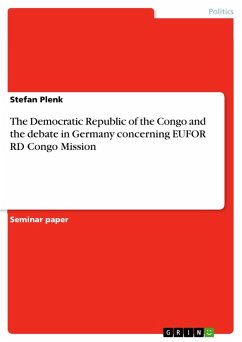
The Katz & Mair - Koole Debate about 'Cartel Parties' (eBook, ePUB)

PAYBACK Punkte
0 °P sammeln!
Essay from the year 2002 in the subject Politics - Region: Western Europe, grade: A-, Central European University Budapest (Department of Political Science), course: Political Parties, language: English, abstract: The 'cartel party' concept proposed by Richard S. Katz and Peter Mair in Party Politics provoked a debate between the authors and Ruud Koole. In this paper I will redraw and assess this debate concluding with some own remarks. In their piece Katz & Mair challenge the predominance of the 'mass party' or 'catch-all party'-models in the literature on political parties. The contemporary ...
Essay from the year 2002 in the subject Politics - Region: Western Europe, grade: A-, Central European University Budapest (Department of Political Science), course: Political Parties, language: English, abstract: The 'cartel party' concept proposed by Richard S. Katz and Peter Mair in Party Politics provoked a debate between the authors and Ruud Koole. In this paper I will redraw and assess this debate concluding with some own remarks. In their piece Katz & Mair challenge the predominance of the 'mass party' or 'catch-all party'-models in the literature on political parties. The contemporary problems in applying these models are usually being interpreted as a 'decline of party'. In contrast to that, Katz & Mair propose a new model, the so-called cartel party as an ideal type towards party organization is developing. To illustrate this, the authors draw evolutionary stages of party development underlining in particular the relative position of parties in front of state and civil society and the reflection of that relationship in the inner-party organization, their finances, and the underlying concept of democracy.
Dieser Download kann aus rechtlichen Gründen nur mit Rechnungsadresse in A, B, BG, CY, CZ, D, DK, EW, E, FIN, F, GR, HR, H, IRL, I, LT, L, LR, M, NL, PL, P, R, S, SLO, SK ausgeliefert werden.













